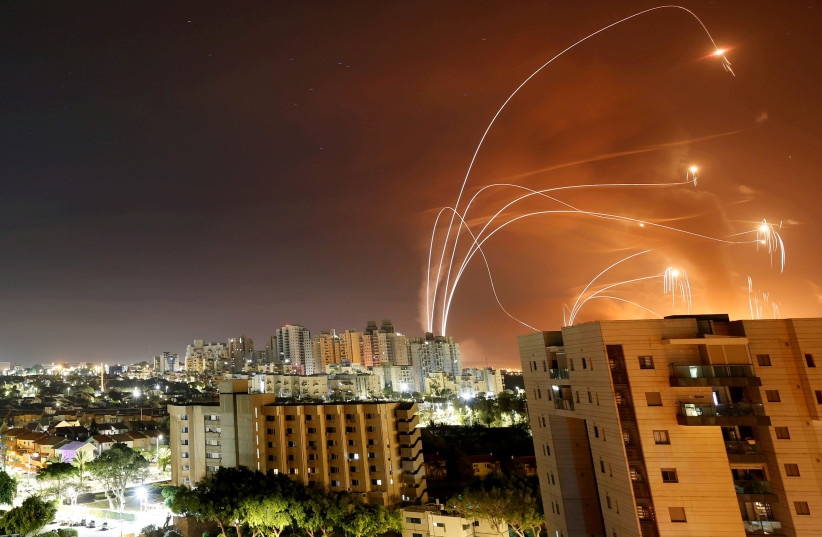Just six months after a costly operation, deterrence has once again been lost
ANNA AHRONHEIMPublished: JANUARY 2, 2022 15:43

It wasn’t lightning that led to two rockets being fired toward central Israel just a few hours into the new year. That excuse has been used and abused enough already.
Hamas has used the excuse of lightning strikes causing rockets to be launched toward Israel before, including in November 2020. In that incident, two rockets were fired and landed north of Ashdod, and the other struck Palmahim Beach. In response, IAF jets struck military positions and an underground structure belonging to Hamas.
Lightning was also blamed for a rocket that struck a home in Mishmeret, a moshav in the Sharon plain, and wounded seven people in March 2019. Another in October 2018 destroyed a home in Beersheba. Another landed off the coast.
cnxps.cmd.push(function () { cnxps({ playerId: ’36af7c51-0caf-4741-9824-2c941fc6c17b’ }).render(‘4c4d856e0e6f4e3d808bbc1715e132f6’); });
All the rockets had been aimed toward Israel and were primed.
Former prime minister Benjamin Netanyahu was willing to accept the excuse of “bad weather” as it wasn’t a convenient time for Israel to begin a military operation, and neither is it a convenient time for the government coalition.
 PRIME MINISTER Naftali Bennett holds a press conference about the Omicron variant last week in Jerusalem. (credit: MARC ISRAEL SELLEM)
PRIME MINISTER Naftali Bennett holds a press conference about the Omicron variant last week in Jerusalem. (credit: MARC ISRAEL SELLEM)
Israel has more pressing matters to deal with at the moment, be it the wave of Omicron or the threat of a nuclear Iran and its proxy Hezbollah on its northern border.
 PRIME MINISTER Naftali Bennett holds a press conference about the Omicron variant last week in Jerusalem. (credit: MARC ISRAEL SELLEM)
PRIME MINISTER Naftali Bennett holds a press conference about the Omicron variant last week in Jerusalem. (credit: MARC ISRAEL SELLEM)Israel has more pressing matters to deal with at the moment, be it the wave of Omicron or the threat of a nuclear Iran and its proxy Hezbollah on its northern border.
The rocket fire comes shortly after the military boasted about the deterrence it has achieved vis-à-vis terrorist groups facing Israel, especially Hamas and Palestinian Islamic Jihad in the Gaza Strip.
The last military operation against those two groups, which last 11 days, has brought a longer period of operational quiet in the blockaded coastal enclave than any of the three previous operations, senior IDF officers have told reporters.
In the six months following Operation Guardian of the Walls, only five long-range rockets were fired from Gaza, while 22 rockets were fired after Protective Edge in 2014, 196 rockets after Cast Lead in 2009 and 76 after Pillar of Defense in 2012.
Does that make it any better: that instead of rockets numbered in double digits, it’s fewer than 10?
No. Why should there be any rockets fired so soon after a military operation that the military is so proud of?
The IDF admits that it struggles to prevent the terrorist groups from launching rockets into Israel and that despite carrying out thousands of strikes, both groups still have a large arsenal primed and aimed at Israel.
The Israeli military says while it has improved its ability to locate launch sites and destroy them shortly after launches, the number of rockets and mortars still poses a major threat. The IDF expects to dedicate considerable resources in the coming year to counter missile threats from Gaza, including establishment of a specialized team within the General Staff to address the issue and develop new technologies and tactics.
The IDF says it has also sharpened its response to projectiles, whether rockets or incendiary balloons. For example, in response to the five rockets and several incendiary balloons, the military dropped some 80 tons of munitions on Hamas facilities.
But what did it do when a “rogue” sniper shot and slightly wounded an Israeli civilian just days before the rocket fire? The response was a few tank shells fired toward empty Hamas posts along the border.
The excuse of bad weather would not be accepted anymore, Prime Minister Naftali Bennett said Sunday, adding that whoever launches rockets toward Israel will suffer the consequences.
While Israel does not have to launch another military operation so soon after the last because of two rockets, military officers cannot say deterrence is strong and expect the public to believe them.
The explosions heard across central Israel say otherwise. Just six months after a costly operation, deterrence has once again been lost.
Content retrieved from: https://www.jpost.com/arab-israeli-conflict/article-690370.